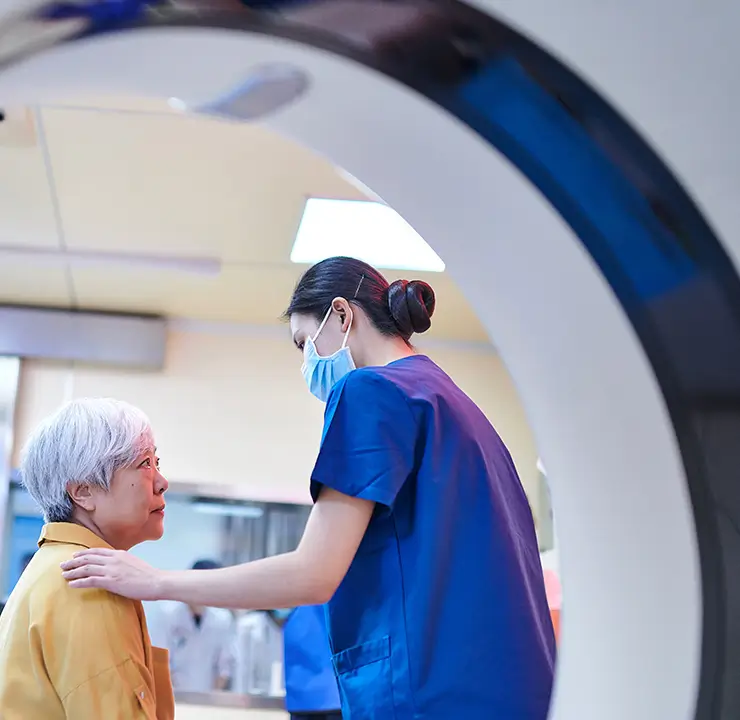
Radiation Therapy
Radiation therapy uses high intensity radiation beams to kill cancer. Our ultramodern tools target the cancer, sparing healthy surrounding tissue.
Besides destroying malignancies, radiation therapy also shrinks tumors before surgery or relieves symptoms from painful tumors.
We’ll use the most modern methods to help cure cancer and other conditions.
Our approach to radiation therapy treatment
Getting a cancer diagnosis is life-changing, and we understand what you and your family must be feeling.
We emphasize a whole-person approach to care, which includes both superb medical treatment and emotional support.
- More than half of all people diagnosed with cancer are treated with radiation therapy, which is also called radiotherapy.
- We offer the most advanced radiation therapies available
- Expect a comfortable and compassionate setting
- Our approach is multidisciplinaryOur team of clinicians communicate with you and each other throughout the entire process
Typically, your multidisciplinary team might consist of radiation oncologists, medical physicists, radiation therapists, medical dosimetrists and other specialists.
They work closely with your surgeon, medical oncologist and other healthcare professionals
The pathway to radiation treatment
If you’ve been diagnosed with cancer or other conditions that radiation cures, you’ve already had imaging tests like MRI or CT scans. The first step in your treatment plan is a consultation.
A radiation oncologist will examine your imaging and other test results and discuss your medical history. They’ll describe the radiation process, how it helps, and any possible side effects.
At UCI, we decide collaboratively on your course of treatment, taking your preferences into account.
The next step is called simulation. The radiation oncologist will use your imaging scans to define the treatment area. They may position you on the radiation room table and mark the treatment area.
Next, your clinicians will make a treatment plan to calibrate how much radiation they’ll deliver and how often.
You’ll come in for treatment a certain number of times and then we’ll follow up with you.
How does radiation therapy work?
Radiation therapy works by damaging the DNA of your cancer cells, killing them with beams of radiation.
Your radiation oncologist works closely with your doctors and surgeons. Together, they calibrate the intensity of the radiation you need for the treatment area.
We design our treatments to limit the radiation exposure to surrounding healthy tissue. This preserves the healthy areas near the tumor and reduces side effects.
Will I need treatments besides radiation?
Radiation might be the only treatment you need. In other cases, we provide radiation first to shrink a tumor before surgery. Or we may use it afterward to destroy any remaining cancer cells.
We also use radiotherapy to provide relief from painful and difficult symptoms the tumor may cause.
Your case is unique. You might benefit from a combination of radiation, surgery and/or chemotherapy.
How is radiation therapy given?
We can deliver radiation therapy:
- outside the body (externally)
- internally
- it’s often a daily procedure for several weeks
- sometimes it’s several treatments per day
- it’s usually outpatient
We deliver external radiation from a machine called a linear accelerator. External radiation is the most common type.
Internal radiation therapy involves implanting a radioactive source next to or inside the tumor.
We usually insert a small plastic or metal tube in the body temporarily to hold the material in place.
You may be a candidate for both external and internal forms of radiotherapy.
How does my doctor know exactly where to direct the radiation?
Our radiation specialists use CT scans, MRI scans and PET scans.
These generate a simulated 3D view of the tumor inside your body. They calculate the amount of radiation you should receive.
Once you’re on the treatment table, they take X-ray images to help correlate your body’s position with that of the tumor.
We use this data to ensure exact delivery of the radiation beams.
Because these machines are so precise, there’s less than a millimeter variance for each subsequent treatment.
What are the side effects of radiation?
Your doctor will discuss any possible side effects. What they are will depend on the site being treated and the dose of radiation.
We’ll see you at least weekly during your treatment. During your visit, please let our radiation therapy team know about any symptoms you’re experiencing and any changes in your medications. We’ll treat any symptoms at that time.
In general, your skin could be very sensitive during radiation treatment. We recommend wearing loose-fitting clothing during your course of treatment to avoid friction with your skin.
Avoid direct sunlight on the area treated. Your doctor can recommend lotions to soothe your skin, which you should apply after daily treatments.

Modern radiation is faster and has fewer side effects
Our goal is to expel all intruder cells quickly and with pinpoint accuracy. Partner with us to find the healthiest and best radiation option for your illness.
Call us at 714-456-5651 to make an appointment.
The benefits of radiation therapy
Advances in radiotherapy have created options we never had before.
We can sculpt a radiation beam to match the dimensions of your tumor, which minimizes harm to nearby tissue.
It’s important to note that external and internal radiotherapy isn’t just for cancer.
We use radiation on benign tumors as well as epilepsy, thyroid disease, blood disorders and other conditions.
Our external radiation therapy treatments include:
- TrueBeam™ STx
TrueBeam delivers powerful, highly focused radiation beams eight times faster than previous systems and with finer precision.TrueBeam rotates 360 degrees around you, delivering prescribed radiation doses from any angle.
It treats cancer of the:
- Abdomen
- Brain
- Breast
- Gynecologic cancers
- Head and neck
- Liver
- Lung
- Prostate
- Spine
- RapidArc™ radiotherapy system
RapidArc allows us to treat tumors in virtually any part of your body using precise imaging. It rotates 360 degrees around you and can deliver radiation in about two minutes.
Because you don’t have to sit still as long, you’re more comfortable. There are fewer side effects than other forms of therapy.
- Intensity-modulated radiation therapy (IMRT)
IMRT is especially useful to treat tumors near your brain or spine, preventing damage to those critical systems.
IMRT is noninvasive and uses 3D imaging from CT scans. The radiation beam mimics the size and shape of your tumor.
It delivers potent radiation from multiple angles while minimizing damage to nearby areas, reducing side effects.
- Image-guided radiation therapy (IGRT)
IGRT successfully treats tumors in parts of your body that move, like your lungs or prostate.
This treatment also spares healthy tissue. With its high-powered beams, your doctors can use less of it, shortening your overall treatment time. This in turn reduces side effects.
- Stereotactic radiosurgery (SRS)
SRS is radiation that targets small or inaccessible brain and spinal tumors.
If you’re not a good candidate for surgery or anesthesia, SRS is an excellent option.
- Stereotactic body radiation therapy (SBRT)
SBRT delivers benefits similar to SRS but for tumors elsewhere in the body as small as a few millimeters in diameter.
Internal radiotherapy treatments include:
- Y90 microspheres therapy, including radio-embolization, SIRTEX SIR-Spheres and TheraSpheres
We use Y90 microspheres therapy to treat liver cancer, metastatic colorectal cancer and other malignant cancers. This is a minimally invasive, usually painless outpatient procedure. It allows us to deliver higher doses of radiation directly into the tumor than we can with external radiation.
Our Interventional Radiology department usually takes care of these treatments.
- Brachytherapy (internal radiation)
This form of high-dose rate brachytherapy works well for breast, gynecological, head and neck and eye cancers. It’s best suited for tumors that have not spread. We do both intracavitary and interstitial brachytherapy for gynecologic cancers using image guidance.
How to prepare for radiation and what to expect
We’ll direct you to a patient changing area where you’ll have access to a locker to secure your clothing and belongings. Wear comfortable clothing that’s easy to remove.
In the treatment room, a radiation therapist will assist you throughout the procedure. The therapist will help you with proper placement on the treatment table.
The equipment makes a high-pitched noise when activated. We encourage you to bring your favorite music to play on a stereo system in the treatment area.
You’ll be in constant contact with the radiation therapists. As they deliver brief bursts of radiation, the therapist stays in contact through a video camera and audio system. We can always halt treatments in an emergency.
Our other recommendations include:
Do not use deodorant, lotion, perfume or cologne on the skin being treated with radiation
Avoid applying lotions to your skin prior to a treatment.
Do not shave the hair in the area under treatment.
Do not use ice or hot packs on the skin area under treatment.
Note that commercial deodorants contain metals that react with the skin. Many lotions also contain alcohol that can irritate your skin.
What happens after my radiation treatment?
After your radiation treatment, you can expect to come in for follow-up appointments.
Your doctors will monitor the progress of your radiation treatment by conducting imaging tests.
We encourage you to share any of your concerns about side effects and we’ll help you manage them.
Why choose UCI Health for radiation therapy?
The Chao Family Comprehensive Cancer Center is a national leader
As a National Cancer Institute-designated comprehensive cancer center, we’re in rare company, one of only 57 in the country.
The benefits to you are:
- every service area is highly collaborative and specialized
- you have a multidisciplinary team working on your case
- we have a higher long-term survival rate compared to centers that are not NCI-designated
- you get access to leading-edge techniques, and
- access to experimental treatments in our clinical trials
We educate you – ask us anything
As an academic hospital, we are used to answering our medical students’ questions, and yours. Our enormous clinical and academic experience offers a distinct practical advantage.
Feel supported both medically and personally
It’s overwhelming to navigate the social and emotional fallout from a serious cancer treatment.
Our Cancer Survivorship Services program is available after your cancer treatment is over. No matter which form of cancer you’ve been dealing with, this program is available to assist you. We can help with financial counseling, anxiety, depression, or radiation side effects.
Our leading-edge technology and personalized treatment plans minimize side effects, enhance your comfort, and optimize treatment outcomes
Our team of experts is committed to providing compassionate care and improving your quality of life while you undergo radiation therapy.
Featured Blog Posts

Lung cancer screening is essential for early detection, treatment
UCI Health is offering a new clinical trial to expand screening to relatives of certain lung cancer patients.

Gastric cancer survivor credits novel clinical trial therapy

'Get your mammogram,' urges breast cancer survivor
Annual screenings can detect breast cancer early, when it is most treatable, says UCI Health breast cancer survivor Barbara Cortez.




